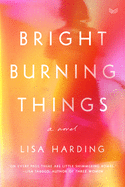
Irish novelist Lisa Harding doesn't shrink from difficult subjects; her debut, Harvesting, took on the tough topic of sex trafficking so skillfully that it won the 2018 Kate O'Brien Award and was a finalist for the Irish Book Awards' Newcomer of the Year. In her soul-piercing sophomore novel, Bright Burning Things, Harding has crafted a sensitive, nuanced portrait of a single mother whose deep descent into alcoholism jeopardizes everything she holds most dear.
Harding's opening segment is a similar experience to riding a tilt-a-whirl: a fleeting moment of stability that soon accelerates into whirling, whiplashing flight. Readers first meet Sonya, her four-year-old son, Tommy, and Herbie, their rescue dog, as they stroll on the beach. The family outing looks wholesome and normal from Sonya's perspective as she playfully kisses Tommy "over and over as he laughs and pretend-wrestles me away." However, the idyllic image shatters when she impulsively strips to her underwear and goes swimming, leaving the child unsupervised and the dog unleashed. When a concerned stranger tries to intervene, Sonya berates her, bundles boy and dog into her car, and speeds off wet and undressed, "bare feet slipping on the pedals." It's readily apparent that Tommy isn't enjoying the trip, and that readers cannot trust Sonya's narrative integrity. The tilt-a-whirl is in motion, and the g-force pressing readers into their seats won't let up anytime soon.
Through her capricious yet graceful stream-of-consciousness narration, Sonya reveals that her once-promising career as an actress ran dry after Tommy was born. Her glamour days gone, she supports herself and "my boys" with government benefits supplemented with theft. To calm her anxiety, she focuses on "the promise waiting for me in the fridge," a bottle of white wine. She drinks to calm herself from the stress of the beach incident, then drinks more to tame her impulse to force-feed a recalcitrant Tommy his dinner of microwaved baked beans. Tommy winds up giving his dinner to the dog, but, under the influence of "the liquid silk that could anaesthetize me to everything," Sonya simply admires her son's sweet nature and tells herself she will feed him later. Later, however, she awakens to a burning smell and leaping flames in the oven; she has fallen asleep with the broiler on. After the fire is out, Sonya soothes her "jangling" feeling by drinking another bottle, her back turned to her son so she can "[t]ell myself that what Tommy doesn't see can't hurt him."
The situation deteriorates as Sonya fails to provide for Tommy and Herbie, often frightening them with her erratic, sometimes dangerous behavior. She clearly bears profound love for them but smothers herself in a thick layer of denial that rationalizes her actions. She assures readers that other people are the problem: Tommy uses a supercilious tone, the neighbor who worries about them is nosy, the man who intervenes when she hits Tommy has an "overdeveloped sense of responsibility." Her moments of clarity convey her lack of control, such as when Tommy asks if she is thirsty and she silently replies, "This is unquenchable, sweetheart. I'm sorry I'm sorry I'm sorry." She is at times impossible to like, and yet impossible not to love as she haphazardly reveals snatches of unresolved grief for her lost career and the mother she lost as a little girl. Her child and pet are unsupported and vulnerable, and yet so is Sonya, who is a parent but not truly a grownup.
When her neighbor notifies the authorities, Sonya's estranged father presses her into entering a rehab facility run by Catholic nuns. The recovery period brings the stress of separation from Tommy, whom her father places in foster care after promising to look after him (and who farms out Herbie). Catastrophic thoughts about his well-being prey on her mind. At the same time, Sonya looks at the male residents and realizes their parents were addicts, too. If she can't get better, she may doom Tommy to the same fate. This epiphany mirrors the plot's elegant illustration of the cyclical nature of trauma. Parallels between the way Sonya's father treats her and her actions toward Tommy show how elders can hand down trauma and abuse like family heirlooms. Sonya's romantic relationships echo her early childhood experiences as she unconsciously gravitates toward a toxic but familiar dynamic. With these ties binding her, what Tommy calls the "[b]ad fairy in the bad bottle" will always wait in the wings, its shadow threatening to flicker back over their lives.
Like its heroine, Bright Burning Things is defiant and challenging, a wisp of crackling flame that illuminates even as it devours. Harding's intimate and exquisite character work draws readers toward new depths of empathy and forgiveness. With its tenderness for the protagonist, this novel stands as a searing indictment of the stigma placed on addiction and the undue burden laid on mothers, and as a plea for understanding as much as for change. --Jaclyn Fulwood

